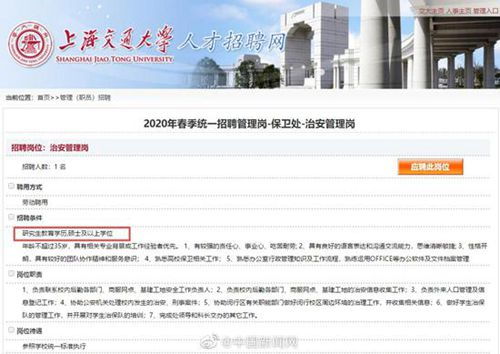上海大学保卫部
Title: Exploring the Role of Security Departments in Academic Institutions: A Case Study of Shanghai University
In recent years, security concerns on university campuses have become increasingly prominent. Instances of theft, vandalism, and even violence have highlighted the importance of robust security measures within academic institutions. Shanghai University, as one of China's leading educational institutions, faces similar challenges in ensuring the safety and security of its students, faculty, and staff.
Understanding the Role of the Security Department:
The security department at Shanghai University plays a multifaceted role in maintaining a safe and secure environment conducive to learning and research. Their responsibilities encompass a wide range of tasks, including:
1.
Campus Patrols:
Security personnel conduct regular patrols across the university campus to deter criminal activities and respond promptly to any incidents.2.
Access Control:
Managing access to university buildings and facilities is crucial for preventing unauthorized entry and ensuring the safety of occupants.3.
Emergency Response:
In the event of emergencies such as fires, medical crises, or security threats, the security department coordinates with relevant authorities to mitigate risks and ensure the safety of everyone on campus.4.
Crime Prevention:
Implementing proactive measures to prevent crimes such as theft, assault, and harassment through awareness campaigns, security assessments, and collaboration with law enforcement agencies.5.
Student and Faculty Protection:
Providing a safe environment for students and faculty members to study, teach, and conduct research is a top priority. Security personnel are trained to handle various situations sensitively and effectively.Challenges Faced by the Security Department:
Despite their best efforts, security departments in academic institutions often encounter challenges that hinder their ability to fulfill their responsibilities adequately. Some common challenges include:
1.
Limited Resources:
Budget constraints may limit the security department's capacity to invest in advanced technology, training programs, and personnel recruitment, impacting their effectiveness in addressing security concerns.2.
Dynamic Threat Landscape:
The evolving nature of security threats, including cyber threats, campus violence, and terrorism, requires constant adaptation and vigilance on the part of security personnel.3.
Balancing Security and Privacy:
Maintaining a balance between implementing stringent security measures and respecting individuals' privacy rights can be a delicate task, especially in academic environments that value openness and academic freedom.4.
Community Engagement:
Building trust and cooperation with students, faculty, and staff is essential for effective security operations. However, achieving meaningful engagement and collaboration can be challenging amidst competing priorities and interests.Recommendations for Enhancing Campus Security:

To address these challenges and enhance campus security at Shanghai University, the following recommendations are proposed:
1.
Investment in Technology:
Leveraging technology such as CCTV cameras, access control systems, and emergency notification platforms can improve surveillance capabilities and response times.2.
Training and Development:
Providing ongoing training programs for security personnel to enhance their skills in conflict resolution, emergency response, and cultural sensitivity can enhance their effectiveness in diverse situations.3.
Collaboration with Stakeholders:
Establishing partnerships with local law enforcement agencies, community organizations, and other universities can facilitate information sharing, resource allocation, and coordinated responses to security threats.4.
Promoting a Culture of Safety:
Fostering a campus culture that prioritizes safety, respect, and responsibility through awareness campaigns, workshops, and studentled initiatives can empower the entire university community to contribute to campus security.5.
Regular Security Assessments:
Conducting regular assessments of campus security vulnerabilities and risks can identify areas for improvement and guide strategic planning and resource allocation.Conclusion:
In conclusion, the security department at Shanghai University plays a crucial role in ensuring the safety and wellbeing of its campus community. By addressing challenges, implementing proactive measures, and fostering collaboration, the university can create a safer environment conducive to academic excellence and personal development. Through continuous effort and innovation, Shanghai University can serve as a model for effective campus security practices in China and beyond.
References:
1. Shanghai University Official Website https://en.shu.edu.cn/
2. "Enhancing Campus Safety and Security: A Guide for Colleges and Universities" by Melvin H. King and Jr. Marion F. Justen
3. "Campus Security and Law Enforcement" by Jeffrey W. Morenoff and David J. Harding.












评论
匿名用户
回复上海大学宝山校区保卫处:校园安全的守护者。